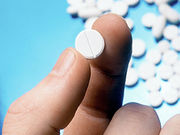Nitrates reduce activity, quality of life, researchers find
THURSDAY, Dec. 10, 2015 (HealthDay News) — Nitrates don’t improve quality of life or everyday activity levels as intended in patients with heart failure, according to research published in the Dec. 10 issue of the New England Journal of Medicine.
Margaret Redfield, M.D., a professor of medicine at the Mayo Clinic in Rochester, Minn., and colleagues randomly assigned 110 patients with heart failure and a preserved ejection fraction to six weeks of daily treatment with an increasing dose of isosorbide mononitrate — from 30 to 120 mg — or to take a placebo. Six weeks into the study, the groups switched medication regimens, and the trial continued for another six weeks. Participants wore accelerometers to measure daily activity levels.
The researchers found that patients receiving the 120-mg dose of isosorbide mononitrate tended to have reduced daily activity and a significant decrease in the hours of daily activity, compared with those receiving the placebo. As the dose of isosorbide mononitrate increased, activity levels decreased; however, they remained steady among those taking the placebo. Also, no significant difference between the groups was seen in distance walked within six minutes or in quality-of-life scores. And there was no difference in levels of N-terminal pro-brain natriuretic peptide.
Moreover, nitrates did not improve exercise capacity or symptoms of heart failure, such as shortness of breath and weakness when walking, according to Redfield, and symptoms tended to be worse among those taking the drugs. “This study should change practice,” Redfield told HealthDay. “Long-acting nitrates should not be used for symptom relief in heart failure.”
Full Text (subscription or payment may be required)
Copyright © 2015 HealthDay. All rights reserved.








